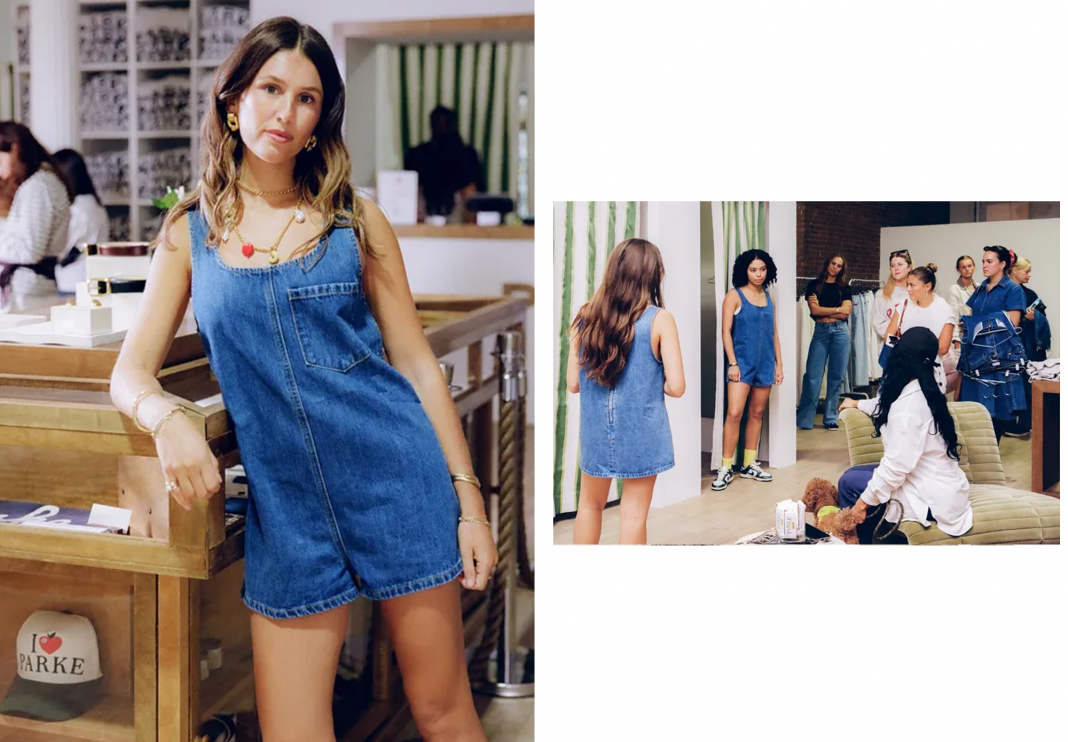From dorm rooms in Delaware to sorority houses in Mississippi, one sweatshirt has become the must-have item for college-aged women across America. Parke—a loungewear brand founded by 28-year-old Chelsea Kramer—is more than just a fashion label; it’s a cultural moment. What started as a modest TikTok-fueled brand selling upcycled denim has exploded into a multimillion-dollar business centered on one simple idea: thick, cozy, embroidered sweatshirts that feel like a flex. But behind the slow-moving pop-up lines and sold-out drops is a founder trying to scale a small business without losing its cool.
From TikTok dreams to viral sweatshirts
Parke didn’t begin with grand ambitions. When Chelsea Kramer launched her brand in 2022, it was a passion project fueled by vintage Levi’s and iron-on patches. With her mom shipping orders from their New Jersey garage and her sister-in-law Kira as her first hire, Kramer built a niche following through thrifted denim and bubbly TikTok content. But it was a vintage-inspired, mock-neck sweatshirt—with varsity-style embroidery and Princess Diana vibes—that turned her into an internet sensation.
By 2023, those oversized sweatshirts had become campus currency. Girls at NYU, Ole Miss, and Michigan snapped up new colorways as fast as Kramer could release them. Her follower count skyrocketed, and Parke’s sales surged past $16 million. Unlike the logo tees of Abercrombie or the varsity hoodies of Gap, Parke felt personal. “Her name’s cool, the fit is great, and it feels different,” said Lexi, a 27-year-old student who lined up at 6:30 a.m. for a Parke pop-up in Soho. “It’s like I’m in a club where everyone gets it.”
The brand next door
Kramer’s appeal lies in her relatability. Online, she’s the “cozy girl” with a fresh blowout and a soft Miami glow—chatting about Pilates, Paris trips, and casual dinners in Parke sweats. Her content mixes outfit hauls with behind-the-scenes peeks into product development, offering followers a rare mix of lifestyle envy and entrepreneurial inspiration. “I love that she’s the face of the brand,” said Lyla, a 19-year-old student from Mississippi. “It’s like I’m buying into her world.”
That world is surprisingly intimate. Parke is still a family-run business, and Kramer doesn’t take a salary, opting instead to support herself through brand deals. The company now has 13 employees and runs on a monthly “drop” model—small-batch releases in limited colors and fabrics. It’s a strategy borrowed from streetwear, one that fuels demand but sometimes frustrates loyal fans. One Valentine’s Day release sold out in minutes, prompting tearful TikToks from customers who couldn’t snag a piece.
When hype meets pressure
Kramer knows the risks of scarcity all too well. “We hate when customers can’t get what they want,” she said. After the Valentine’s sellout, Parke’s team decided to scale up production—but only slightly. “We’ve always been afraid of overextending,” said Kira. “We’re not even three years old. We can’t forget that.”
Still, they’ve had to learn fast. Demand doubled between summer and winter 2024, catching them off guard. At one point, over 80,000 people tried to shop a single drop. They’ve since begun expanding manufacturing, but recent tariffs and supply chain delays have complicated things. “We thought about canceling the New York pop-up,” Kramer admitted. Instead, they rescheduled some releases and braced for higher production costs.
In the meantime, fans continue to show up in droves. At the Soho pop-up, nearly 1,000 people came on the first day. For shoppers like Allie Sisco, a 21-year-old student from Delaware who owns 15 Parke sweatshirts, the appeal goes beyond fabric and fit. “Chelsea’s a role model. Just seeing her in real life made me emotional,” she said.
Navigating backlash and brand authenticity
As Parke’s profile grows, so do the critiques. In April, a viral TikTok accused the brand of white-labeling—buying cheap products from Chinese factories and branding them as Parke originals. Kramer denied the claim, stating that every Parke item is custom-designed with technical oversight and multiple fit adjustments. “When something isn’t true, giving it attention just makes it worse,” she said, choosing not to respond publicly to the allegations.
That hasn’t stopped detractors. The “de-influencing” trend on TikTok has prompted users to question the value of logo-driven brands like Parke, Daily Drills, or Dairy Boy. Still, many fans remain unfazed. “I haven’t bought another sweatshirt besides Parke in over a year,” said Sisco. “And I don’t plan to.”
Kramer remains in the comments—responding to concerns about shipping delays, fit issues, and customer frustrations. It’s a hands-on approach that makes Parke feel more human than hype machine, even as the company inches toward mass-market status.
What comes after the mock-neck?
As Parke matures, Kramer is already thinking ahead. The brand has expanded into elastic-waist denim shorts, rompers, and jackets. But sustaining relevance in fashion, especially with a core Gen Z audience, is a tricky balancing act. “We’ve always known this moment might not last,” Kramer said. “What happens when mock-necks aren’t cool anymore?”
Whatever comes next, it’s clear that Parke has carved out a unique space at the intersection of fashion, content, and community. And for thousands of young women, wearing that oversized embroidered sweatshirt is more than just a style statement—it’s a shared identity.



